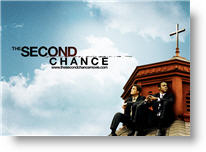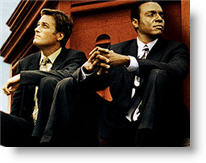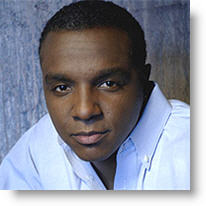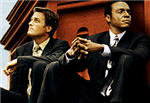The Second Chance
 for some drug references.
for some drug references.
Reviewed by: Willie Mangum. Jr.
CONTRIBUTOR
| Moral Rating: | Good |
| Moviemaking Quality: |
|
| Primary Audience: | Adults Teens |
| Genre: | Religion Drama |
| Length: | 1 hr. 42 min. |
| Year of Release: | 2006 |
| USA Release: |
February 17, 2006 (wide) |





Hypocrisy in the Church—Why would I want to be a Christian when there are so many hypocrites? Answer
Why should Christians go to church? Answer
Is there a Biblical mandate that all Christians be involved in a local body of believers if possible? Can a Christian survive apart from a church?
Are you good enough to go to Heaven? Answer
| Featuring |
|---|
| Michael W. Smith, J. Don Ferguson |
| Director |
|
Steve Taylor |
| Producer |
| Benjamin Howard, Clarke Gallivan, Coke Sams |
| Distributor |
“Same faith. Same city. Different worlds.”
The film “The Second Chance” opens under the credits with scenes, vignettes if you will, of gritty, inner-city realism, setting the stage for this “walk a mile in my shoes” story of personal integrity and obedience to the call of God in a fallen and broken world.
Contemporary Christian music artist Michael W. Smith makes his feature film debut as Ethan Jenkins, the wayward son come home and heir apparent to the pulpit of The Rock, the ministry empire of his father, Jerry Jenkins (J. Don Ferguson). The elder Jenkins is building a worldwide ministry, planting churches all across the globe for the sake of the Kingdom. His first church plant, a small, struggling congregation on the wrong side of town, has become a local ministry focus as The Rock provides much needed funds to run outreach to the down and out of the inner-city.
Jake Sanders (Jeff Obafemi Carr) is the pastor of this church, hand-picked by the elder Jenkins to be his youth pastor and, now, pastor of this work. Through circumstances that are not altogether clear, we see the younger Jenkins thrown into partnership with Jake, against both his and Jake’s will. Will he survive this ordeal and take his rightful place at The Rock?
“The Second Chance” opens with powerful vignettes and never rises above them. One vignette after another pasted together to form a cinematic mosaic that never really achieves the goal of story. At least not one story, unified by plot and unfolding through three acts punctuated by intriguing plot points, or story turns. Not one story that allows us to know and embrace the characters to the point that what they say or do really matters.
There are elements of what makes a great film, interesting character traits (Sonny is a believable and, perhaps if we knew him at all, loveable man), conflict, theme, visual elements and interesting camera work and cinematography. But none of the elements ever really come together to rise above TV series mimicry or movie of the week schmaltz and create a great film. The whole piece thumps along from vignette to vignette, eventually reaching a denouement that is nothing approaching climatic.
The film contains several uses of slang “bad words,” but nothing profane or vulgar. There are visual references to prostitution and gang activity, and a brief thrashing for one of the thugs. There is semi-threatening gunplay, the kind that creates a rapid and audible, though brief, inhale, but amounts to nothing more than a quick flirtation with “authenticity of character.”
Many of the vignettes reveal wonderful human values such as courage, sacrifice, humility, etc., and would serve as excellent sermon illustrations on the big screens of most of our mega-churches, against which this film so poignantly rails. There is a message, a moral, if you will, but the story never really materializes.
Here’s what the distributor says about their film: “The Second Chance is a film about two men—one from a white church in the well-to-do suburbs and one from a black church in the inner-city projects. Although founded by the same man, each church manifests its mission in a very different way. This film authentically tells the story of how a rebellious son and a street-smart pastor struggle to bridge the gap between their respective churches and cultures. More importantly, at its core, The Second Chance is about being willing to step outside your comfort zone and serve where you are called.
Jeremiah Jenkins (J. Don Ferguson) founded Second Chance Community Church amid the turbulence of the civil rights demonstrations in the sixties. He has since moved from the inner city to the suburbs where he founded The Rock, a now mega church where community service often takes the form of large donations to the collection plate. He continues to travel the world establishing new churches, but he’s lost sight of the place where his journey as pastor began.
His son Ethan Jenkins (Award-winning performer Michael W. Smith in his first leading role in a feature film) recently left his wayward lifestyle as a West Coast musician to serve as associate pastor at The Rock. He’s busy, affluent and caught up in the big business of a big church. His ministry is more about Sunday simulcasts than service to others. He’s rocking the pulpit and the boat at The Rock, and the church board decides Ethan needs to take a little sabbatical. to Second Chance.
Jake Sanders (introducing Jeff Obafemi Carr) is the Pastor of Second Chance Church. He is street tough and a committed servant to his community. He works hard to keep his church together, and he resents the arrival of Ethan with his fancy car and his “cash can solve anything” attitude. Sparks fly from day one when Jake takes Ethan on a tour of the “hood,” and the various situations they encounter lay bare Ethan’s misconceptions and insecurities. He resented Jeremiah’s decision to move to the suburbs, and now he resents being saddled with his son.
Over the next few weeks Ethan tries gamely to fit in at Second Chance, but even his best efforts end in frustration and failure. Forced to work side by side with Jake, he discovers there is no boundary between the streets and the sanctuary. When the youth pastor from Second Chance takes a beating so that a young man can leave a gang, it shakes Ethan to his core. He questions his own courage and the depth of his Christian convictions.
Jake and Ethan struggle to find common ground as they face street gangs, their own shortcomings, and those who would destroy the community church for political gain. Can the faith Ethan and Jake share overcome the prejudices that divide them to give themselves and a struggling urban church a second chance?”
“The Second Chance” has its place, and certainly a very nice Sunday School curriculum could be written and distributed using this film as a point of reference. We can learn much from the vignettes from Nathan and Jake’s lives, or even the lives of Tony or Sonny. But in the end, this type of film sets Christian filmmakers back to where Contemporary Christian Music was in the eighties, sub-standard knock-offs of mainstream art.
What really bothers me about this film is that it really amounts to a “dirty laundry” diatribe against the current mega-church bureaucracy that really, in the end, is an intramural debate and ought not be so scathingly aired in public. All of those folks who skip church on Sunday morning and cry “hypocrite” are vindicated, to some extent, by this film.
[ Why would I want to be a Christian when there are so many hypocrites? Answer ]
It just so happens that for the most part I agree with producer, writer, and director Steve Taylor, and have since his eighties music run with songs like “Color Code.” Some in the church have turned to high dollar naval-gazing and the rank, borderline-blasphemy of church growth for the sake of growth. All of the “activity” we enable our brothers and sisters to engage in tends toward legalism at best and out right idolatry at worst. We try to earn the stripes of our salvation and all the while ignore the One by Whose stripes we are healed. We do, do, do and go, go, go often to our own spiritual detriment. We miss the point that our good works flow FROM faith, rather than acquire it.
If you want a wonderful, feel-good, popcorn and Pepsi evening at the local Cineplex then I highly recommend “The Second Chance”. If you want to see excellent filmmaking replete with engaging characters, solid plot and sub-plot lines, unexpected plot twists, and a powerful, climactic ending, go see something else. And when this film comes to DVD, buy it or rent it for your pastor and church governing board.
Violence: Minor / Profanity: Minor / Sex/Nudity: None
See list of Relevant Issues—questions-and-answers.


Good / 4
I see that other commentors have called the movie out because of its depiction of pastor’s swearing from the pulpit, guess what some pastor’s actually do struggle with bad language (much in the same way they struggle with lust, pride, arrogance, greed, etc.) as not all pastor’s are born into the Christian lifestyle.
As for slamming “mega-churches” and airing the churches dirty laundry in public… I say kudos to Mr. Taylor for being willing to show the church as it really is. For too long now, the church has become more focused on meeting the budgetary needs of the church than meeting people’s needs, which is one of the underlying story in this mutli-leveled movie.
Someone also wrote that this movie mentions Jesus only once and therefore could not safely be deemed a “Christian” movie. Well, again, as a pastor, I personally don’t go around with “Jesus” and “biblical” quotes coming out of my mouth. As well as preaching Gospel truth, I try to show Jesus in everything that I do, something this movie portrays and should be commended for.
***SPOILER ALERT***
I loved the footwashing scene, and anyone who is a Christian should appreciate such a scene of self-sacrifice that shows a deeply theological truth. I also liked the way the film did not have an overly happy ending, although the main characters had found peace and joy, and I was left wanting more.
Long after the movie finished, I was asking questions raised by this movie—deeply profound questions as to the “realness” of my own ministry and the ministry of the church in general. How interested are we really in the plight of those around us? We say we care and then write a cheque thinking this is enough. But what of the woman caught in a life of prostitution, what of a man who has just lost his family and needs friends around him, and what of the child who needs a loving home? These scenarios and more are tackled in “TSC,” and the question I keep asking myself is “Would I be willing to leave my comfort zone to help these people… people that God loves… His children… my brothers and sisters?”
In short I loved this movie. “TSC” is one of my favourite movies, and I have a very high standard for my “favourite” movies. The soundtrack, the direction, the camera-work, the writing, and the acting, all of these were way above par for a “Christian” film. I feel sad for those who don’t get this film because it’s not made or marketed as a safe “Christian” movie or because it isn’t overly “preachy,” because they are missing out on a truly modern parable. …
Excellent! / 5
Good / 5
I especially appreciate that the Christians in the film are portrayed as having both faults and virtues, unlike most movies where they are either unrealistically pious or villainous hypocrites. This film shows both strengths and weaknesses of the contemporary church. …
Excellent! / 4
Better than Average / 3
Better than Average / 5
Average / 3
However, we all know the saying “going to church does not make a Christian any more than sitting in your garage makes you a car.” The only reference to Jesus was when they sang “On Christ the Solid Rock I Stand” at the end. Church doesn’t save people—Jesus does. If you are going to call it a Christian movie, there should be some Christ in it.
Good / 2
One thing that really annoys me though, is the whole shaky camera thing; I really dislike that. Honestly, it seemed to last for a while, and when it finally wasn’t shaking, I had a headache. But, it was a good movie. Bravo!!!
Better than Average / 3

My Ratings: Good / 3